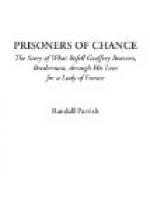Apparently in all simplicity and faithfulness he recorded merely what he saw and heard. Later research, antedating his death, has seemingly proven that in the extinct Natchez tribe was to be found the last remnant of that mysterious and unfortunate race.
Who were the Mound Builders? No living man may answer. Their history—strange, weird, mysterious—stretches backward into the dim twilight before tradition, its sole remaining record graven upon the surface of the earth, vaguely guessed at by those who study graves; their pathetic ending has long been pictured in our country’s story as occurring amid the shadows of that dreadful midnight upon the banks of the Ocatahoola, when vengeful Frenchmen put them to the sword. Whence they came, whether from fabled Atlantis, or the extinct Aztec empire of the South, no living tongue can tell; whither fled their remnant,—if remnant there was left to flee,—and what proved its ultimate fate, no previous pen has written. Out from the darkness of the unknown, scarcely more than spectral figures, they came, wrote their single line upon the earth’s surface, and vanished, kings and people alike sinking into speechless oblivion.
That Geoffrey Benteen witnessed the tragic ending of this strange people I no longer question; for I have compared his narrative with all we moderns have learned regarding them, as recorded in the pages of Parkman, Charlevoix, Du Pratz, and Duponceau, discovering nothing to awaken the slightest suspicion that he dealt with other than what he saw. More, I have traced with exactitude the route these fugitives followed in their flight northward, and, although the features of the country are greatly altered by settlements of nearly two hundred years, one may easily discern evidence of this man’s honesty. For me it is enough to feel that I have stood beside the massive tomb of this mysterious people—a people once opulent and powerful, the warriors of forgotten battle-fields, the builders of lost civilizations, the masters of that imperial domain stretching from the Red River of the North to the sea-coast of the Carolinas; a people swept backward as by the wrath of the Infinite, scourged by famine, decimated by pestilence, warred against by flame, stricken by storm, torn asunder by vengeful enemies, until a weakened remnant, harassed by the French sword, fled northward in the night to fulfil the fate ordained of God, and finally perished amid the gloomy shadows of the grim Ozarks, bequeathing to the curious future neither a language nor a name.
But this I leave with Geoffrey Benteen, and turn to my own simpler task, a review of the peculiar circumstances leading up to this narrative, involving a brief chapter from the records of our Southwest.




